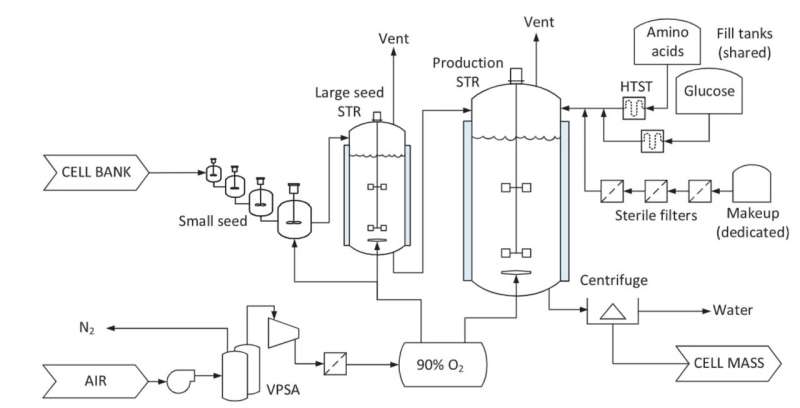This article has been reviewed according to Science X's editorial process and policies. Editors have highlighted the following attributes while ensuring the content's credibility:
fact-checked
preprint
trusted source
proofread
Lab-grown meat's carbon footprint potentially worse than retail beef, finds study

Lab-grown meat, which is cultured from animal cells, is often thought to be more environmentally friendly than beef because it's predicted to need less land, water and greenhouse gases than raising cattle. But in a preprint, not yet peer-reviewed, researchers at the University of California, Davis, have found that lab-grown or "cultivated" meat's environmental impact is likely to be "orders of magnitude" higher than retail beef based on current and near-term production methods.
Researchers conducted a life-cycle assessment of the energy needed and greenhouse gases emitted in all stages of production and compared that with beef. One of the current challenges with lab-grown meat is the use of highly refined or purified growth media, the ingredients needed to help animal cells multiply. Currently, this method is similar to the biotechnology used to make pharmaceuticals. This sets up a critical question for cultured meat production: Is it a pharmaceutical product or a food product?
"If companies are having to purify growth media to pharmaceutical levels, it uses more resources, which then increases global warming potential," said lead author and doctoral graduate Derrick Risner, UC Davis Department of Food Science and Technology. "If this product continues to be produced using the 'pharma' approach, it's going to be worse for the environment and more expensive than conventional beef production."
The scientists defined the global warming potential as the carbon dioxide equivalents emitted for each kilogram of meat produced. The study found that the global warming potential of lab-based meat using these purified media is four to 25 times greater than the average for retail beef.
A more climate friendly burger in the future?
One of the goals of the industry is to eventually create lab-grown meat using primarily food-grade ingredients or cultures without the use of expensive and energy-intensive pharmaceutical grade ingredients and processes.
Under that scenario, researchers found cultured meat is much more environmentally competitive, but with a wide range. Cultured meat's global warming potential could be between 80% lower to 26% above that of conventional beef production, they calculate. While these results are more promising, the leap from "pharma to food" still represents a significant technical challenge for system scale-up.
"Our findings suggest that cultured meat is not inherently better for the environment than conventional beef. It's not a panacea," said corresponding author Edward Spang, an associate professor in the Department of Food Science and Technology. "It's possible we could reduce its environmental impact in the future, but it will require significant technical advancement to simultaneously increase the performance and decrease the cost of the cell culture media."
Even the most efficient beef production systems reviewed in the study outperform cultured meat across all scenarios (both food and pharma), suggesting that investments to advance more climate-friendly beef production may yield greater reductions in emissions more quickly than investments in cultured meat.
Developing the technology that would allow the leap from "pharma to food" is among the goals of the UC Davis Cultivated Meat Consortium, a cross-disciplinary group of scientists, engineers, entrepreneurs and educators researching cultivated meat. Other goals are to establish and evaluate cell lines that could be used to grow meat and find ways to create more structure in cultured meat.
Risner said even if lab-based meat doesn't result in a more climate-friendly burger, there is still valuable science to be learned from the endeavor.
"It may not lead to environmentally friendly commodity meat, but it could lead to less expensive pharmaceuticals, for example," said Risner. "My concern would just be scaling this up too quickly and doing something harmful for the environment."
The study is published on the bioRxiv preprint server.
More information: Derrick Risner et al, Environmental impacts of cultured meat: A cradle-to-gate life cycle assessment, bioRxiv (2023). DOI: 10.1101/2023.04.21.537778
Journal information: bioRxiv
Provided by UC Davis





















